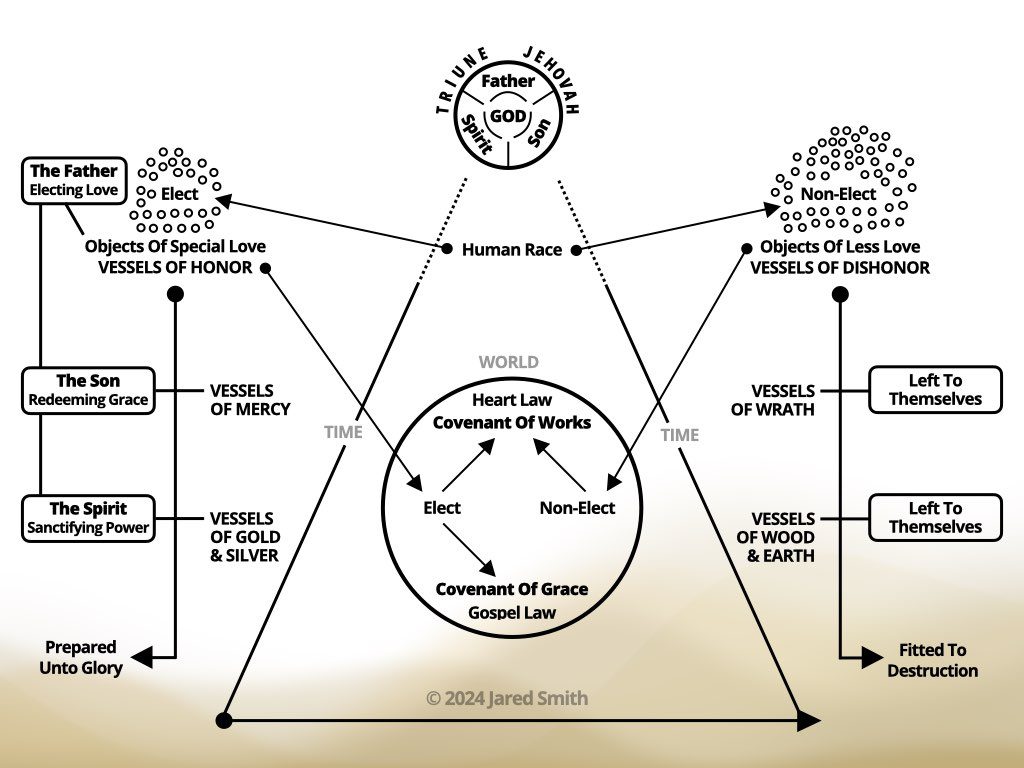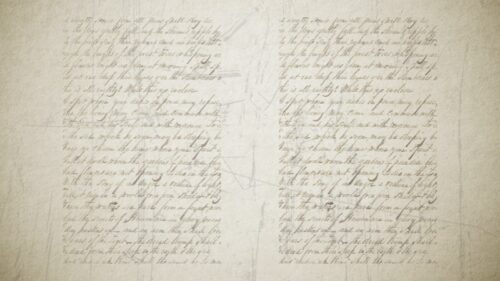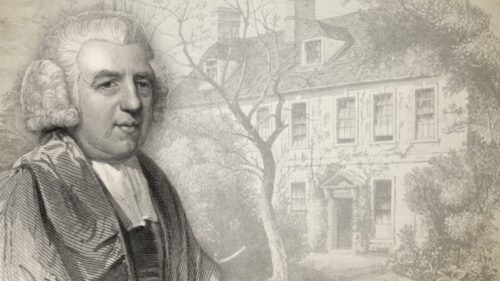Fear Thou Not, Distressed Believer
The Apostle Paul instructed the believers at Colosse to teach and admonish one another in psalms, hymns and spiritual songs. That is what I hope to do by explaining the meaning of this hymn, against the backdrop of the Framework of Sovereign Grace.
The Apostle Paul instructed the believers at Colosse to teach and admonish one another in psalms, hymns and spiritual songs. That’s what I hope to do by explaining the meaning of this hymn—Fear Thou Not, Distressed Believer. I’d like to explain the meaning of the hymn against the backdrop of the Framework of Sovereign Grace. This is the master plan of God for the ages.

You’ll notice the author of the hymn was John Newton. John Newton was an 18th century sovereign grace Anglican preacher. He served 20 years as parish priest for the church meeting at Olney in Buckinghamshire. He’s probably, however, best known for another hymn—Amazing grace, how sweet the sound, that saved a wretch like me, I once was lost, but now I’m found, was blind but now I see. But that wasn’t the only hymn he wrote. He wrote many others—this is one of them—and they are sometimes as good, if not better, than the other hymn (Amazing Grace).
I’d like to read for you the two stanzas of this hymn.
1 Could the creatures help or ease us,
Seldom should we think of prayer;
Few, if any, come to Jesus,
Till reduced to self-despair.
Long we either slight or doubt Him,
But, when all the means we try;
Prove we cannot do without Him,
Then at last to Him we cry.
2 Fear thou not, distress’d believer;
Venture on His mighty name:
He is able to deliver,
And His love is still the same!
Can His pity or His power,
Suffer thee to pray in vain?
Wait but His appointed hour,
And thy plea thou shalt obtain.
This hymn underscores the significance and importance of coming to the Lord in prayer. Now, please listen. Prayer is nothing other than communication or communion with the Lord. If this is you or I in the world (pointing to the Framework of Sovereign Grace), that’s a body and soul. Prayer is communion or communication between us and the Lord, or between the Lord and us.
Now, we who have been born again are the only ones that can enjoy this communion with God. And, we who do enjoy this communion—there’s two different types of prayer or communications.
There’s something called a spirit of prayer. A spirit of prayer is the type of thing we experience when we go through a day or night, and, while we don’t necessarily articulate specific thoughts to the Lord, or the Lord articulates specific thoughts to us, yet we know His presence and we enjoy walking with Him. It’s very similar, for instance, to taking a walk with a good friend or a family member. And, though the two of you may never speak a word the whole time you’re together, yet there is a joyful and unspoken fellowship and enjoyment between the two of you, and the company you share, that constitutes the friendship and communion you have together. So it is with you and I as believers in Christ. We may walk with the Lord without ever articulating specific words, yet we enjoy the presence of God. It’s a spirit of prayer.
The other type of prayer is the articulation of thoughts or words, the articulation of prayer. And this is what you and I should be in the habit of— speaking to the Lord, sharing our thoughts with the Lord, by describing our experiences, our feelings; making known our desires, our aspirations, our ambitions; not being afraid to share our disappointments and our fears, and our doubts and so forth. You see, we should also be searching the scriptures to receive a word from the Lord. Remember, the Bible is God’s articulation of His mind to us. That’s how He communicates His will to us—through the Scripture. And we should search the Scriptures, therefore, for principles and precepts and promises. Those are God’s articulated thoughts to us. And then we are to articulate our thoughts to Him.
And that is what Newton is driving at in this hymn. It’s articulating our thoughts to the Lord in prayer. So,
Stanza 1
“Could the creatures help or ease us,”
Could anything or anyone on this earth be the source of true help to us?
“Seldom should we think of prayer;”
To make our needs known to Him.
“Few, if any, come to Jesus,
Till reduced to self-despair.”
It’s true. It’s only when God removes the other helpers in this world and we are left virtually alone, without help or hope from other people, or creatures or things, that in self despair and in desperation, we then finally turn to God to make our need known to Him.
“Long we either slight or doubt Him,”
To slight Him is to dismiss, despise or disrespect Him.
“But, when all the means we try;”
All the different ways we try to meet our earthly needs.
“Prove we cannot do without Him,
Then at last to Him we cry.”
My dear friend, you should be thankful if it’s your experience now that all of your earthly comforts and hopes and helps; all of the things you used to depend upon, have been taken from you and now you’re left alone and without earthly helpers. For it’s time to turn to God and seek from Him the true help.
Stanza 2
“Fear thou not, distress’d believer;
Venture on His mighty name:”
You can depend upon Him!
“He is able to deliver,
And His love is still the same!”
That’s His love, my dear friend. He has chosen you by His electing love. He has redeemed you by His gracious love through Christ. He is sanctifying you by the effectual power of the Holy Spirit. His love is still the same!
“Can His pity or His power,”
He pities you as a Father pities a child. Can His pity or His power,
“Suffer thee to pray in vain?
Wait but His appointed hour,
And thy plea thou shalt obtain.”
This reminds me of the Apostle Paul who had been given by God, through the instrument of Satan, a thorn in his flesh. And Paul prayed three times for God to remove the thorn from his flesh. How many times do you come before God, my dear friend, asking Him to meet you at your point of need? Do you know what God’s response was to Paul? No! I will not remove the thorn from your flesh. God says to Him, in effect, I placed the thorn in your flesh for a purpose—that you might know My grace is sufficient for you, for in your weakness (that is brought about by the thorn in your flesh), you’ll find My strength to be made perfect. Paul’s response to God’s answer was therefore this—He said, most gladly therefore, will I glory, or rejoice, in my weaknesses, in order that the power of Christ may rest upon me. I take pleasure in my infirmities and reproaches and necessities and persecutions and distresses for Christ’s sake, for when I am weak, then am I strong!
Do you see my dear friend? Could it be that God has brought these various things into your life in order to purposefully weaken you, that you might find the grace of God sufficient for your need? And that you might discover that in your weakness, His strength is made perfect. Are you ready, therefore, to boldly come before the throne of grace to make your need known to the Lord, and with Paul, to rejoice in your weaknesses and disappointments and your infirmities, that the power of Christ may rest upon you?
Well, if you’re ready for that, together now, let’s sing the words of the hymn to the edification of our souls and the glory of God—Fear Thou Not, Distressed Believer.
Jared Smith served twenty years as pastor of a Strict and Particular Baptist church in Kensington (London, England). He now serves as an Evangelist in the Philippines, preaching the gospel, organizing churches and training gospel preachers.
Jared Smith's Online Worship Services
Jared Smith's Sermons
Jared Smith on the Gospel Message
Jared Smith on the Biblical Covenants
Jared Smith on 18th Century Covenant Theology (Hyper-Calvinism)
Jared Smith on the Gospel Law
Jared Smith on Bible Doctrine
Jared Smith on Bible Reading
Jared Smith's Hymn Studies
Jared Smith on Eldership
Jared Smith's Studies In Genesis
Jared Smith's Studies in Romans
Jared Smith on Various Issues
Jared Smith, Covenant Baptist Church, Philippines
Jared Smith's Maternal Ancestry (Complete)






